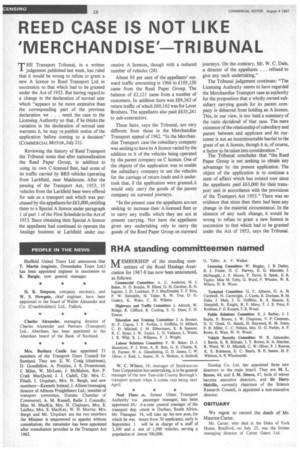REED CASE IS NOT LIKE 'MERCHANDISE' TRIBUNAL
Page 30

If you've noticed an error in this article please click here to report it so we can fix it.
THE Transport Tribunal, in a written judgement published last week, has ruled that it would be wrong to refuse to grant a new A licence to Reed Transport Ltd. in succession to that which had to be granted under the Act of 1953. But having regard to a change in the declaration of normal user which "appears to be more extensive than the corresponding part of the previous declaration we . . . remit the case to the Licensing Authority so that, if he thinks the variation in the declaration of normal user warrants it, he may re-publish notice of the application before coming to a decision" (COMMERCIAL MOTOR, July 21).
Reviewing the history of Reed Transport the Tribunal notes that after nationalization the Reed Paper Group, in addition to using its own C-licensed fleet, had some of its traffic carried by BRS vehicles operating from Larkfield, near Maidstone. After the passing of the Transport Act, 1953, 35 vehicles from the Larkfield base were offered for sale as a transport unit which was purchased by the appellants for £63,000, entitling them to a Special A licence under paragraph 1 of part 1 of the First Schedule to the Act of 1953. Since obtaining their Special A licence the appellants had continued to operate the haulage business at Larkfield under sue cessive A licences, though with a reduced number of vehicles (28).
About 95 per cent of the appellants' outward traffic amounting in 1966 to £105,150 came from the Reed Paper Group. The balance of £2,121 came from a number of customers. In addition there was £89,362 of return traffic of which £60,162 was for Lever Brothers. The appellants also paid £635,241 to sub-contractors.
These facts, says the Tribunal, are very different from those in the Merchandise Transport appeal of 1962. "In the Merchandise Transport case the subsidiary company was seeking to have its A licence varied by the addition to it of the vehicles being operated by the parent company on C licence. One of the objects of the application was to enable the subsidiary company to use the vehicles for the carriage of return loads and it undertook that, if the application were granted, it would only carry the goods of the parent company on outward journeys.
"In the present case the appellants are not seeking to increase their A-licensed fleet or to carry any traffic which they are not at present carrying. Nor have the appellants given any undertaking only to carry the goods of the Reed Paper Group on outward journeys. On the contrary, Mr. W. C. Dale, a director of the appellants . . . refused to give any such undertaking."
The Tribunal judgement continues: "The Licensing Authority seems to have regarded the Merchandise Transport case as authority for the proposition that a wholly owned subsidiary carrying goods for its parent company is debarred from holding an A licence. This, in our view, is too bald a summary of the ratio decidendi of that case. The mere existence of the relationship of subsidiary and parent between and applicant and its customer is not an insurmountable barrier to the grant of an A licence, though it is, of course, a factor to be taken into consideration."
The Tribunal concludes that "the Reed Paper Group is not seeking to obtain any advantage by the present application. The object of the application is to continue a state of affairs which has existed ever since the appellants paid £63,000 for their transport unit in accordance with the provisions of the transport Act 1953." There was no evidence that since then there had been any change in the material circumstance'. In the absence of any such change, it would be wrong to refuse to grant a new_ licence in succession to that which had to be granted under the Act of 1953, says the Tribunal.












































































































